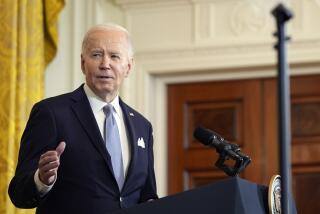Pakistan Arrests Alleged Plotters : South Asia: Three dozen military men are suspected of planning fundamentalist coup.
- Share via
KARACHI, Pakistan — The arrests of three dozen military men, including two generals, with suspected ties to Islamic fundamentalists have sent shivers through Pakistan, highlighting the instability and malaise that confront Prime Minister Benazir Bhutto.
Government officials are being tight-lipped about what the arrested soldiers allegedly did or planned. Well-placed sources said they were plotting to stage a fundamentalist coup. Others said the men wanted to aid insurgents fighting in the Indian state of Jammu and Kashmir.
Many members of Pakistan’s armed forces are hostile to Bhutto, who was elected two years ago today. She also draws the ire of Pakistan’s increasingly vocal Muslim hard-liners, who accuse her of fostering U.S. interests.
“It is because of you that we are suffering,” retired Lt. Gen. Hamid Gul, a former director general of the powerful Inter-Services Intelligence agency with ties to Islamic fundamentalists, said recently to an American visitor. “You have brought the IMF [International Monetary Fund], you have brought the World Bank, you have brought Benazir. And you are supporting an unpopular regime.”
Seen by many Pakistanis as highhanded and corrupt, Bhutto’s Pakistan People’s Party probably would not be able to win even half the number of seats it holds in the National Assembly were new elections held today, contends the Herald, a respected Karachi magazine, in its current issue.
Civilian rule was restored in Pakistan in 1988 after the generals had governed for more than half of the country’s existence. The military remains a key political player, with power shared by the prime minister, president and chief of the army staff.
The officers and soldiers now under arrest may have hoped to break that three-way arrangement that has been in place since the death of military dictator Gen. Zia ul-Haq in a mysterious plane crash on Aug. 17, 1988. However, the defusing of the current crisis indicates that the army chief of staff, Gen. Abdul Waheed, rallied to the prime minister’s side. Waheed is due to retire in January, but Bhutto and her handpicked president, Farooq Leghari, reportedly have asked him to stay on.
Firm details were scanty, but some sources and Pakistani newspaper reports said that an army staff car was stopped by chance at a customs post on the morning of Sept. 26. Inside, along with a brigadier and colonel in civilian clothes, was a cache of rocket launchers and Kalashnikov assault rifles.
Intense questioning led to the arrests of 10 officers, including Maj. Gen. Zaheerul Islam Abbasi, a well-known Islamic fundamentalist who headed infantry training at general headquarters in Rawalpindi, and at least 26 soldiers and an undisclosed number of civilians.
During a weekend meeting with Pakistani newspaper editors, Bhutto confirmed that the arrests were made last month, then left the country to attend the Nonaligned Movement summit in Cartagena, Colombia. President Leghari promised full disclosure once an investigation into the detainees and any accomplices is complete.
*
According to one newspaper report, the officers were preparing to stage a coup on Sept. 30. They planned to eliminate the army’s high command and the top politicians in Islamabad, declare martial law, impose Islamic law throughout the country and proclaim a holy war to wrest the mostly Muslim state of Jammu and Kashmir from India.
Professional frustrations also may have had a part in the disaffected soldiers’ actions. Abbasi was passed over for promotion to lieutenant general, while the arrested brigadier, Mustansar Billah, commanded a brigade before being transferred to army headquarters for a non-operational posting, the Nation newspaper reported.
But some army sources suggested the soldiers had only meant to assist the anti-Indian insurgency in Kashmir and noted that their numbers and weapons were hardly sufficient to take control of Pakistan, a country of more than 125 million people.
*
Despite repeated Pakistani denials, India has accused its neighbor of providing arms and training for Muslim fighters in Kashmir.
The Harvard-educated Bhutto’s moderate brand of Islam has been praised by the Clinton Administration, which also hailed her government’s actions last February that led to the arrest and quick deportation of Ramzi Ahmed Yousef, the alleged mastermind of the World Trade Center bombing in New York in February, 1993, that killed six people and wounded more than 1,000.
Bhutto and her ministers are clearly hoping such actions will pay off with the U.S. Congress, which is preparing for a final showdown on a measure that Pakistan considers crucial. A House-Senate conference is expected to decide soon whether to allow the delivery of $368 million in military equipment that Pakistan has paid for but that has been blocked since 1990, when the United States halted all military and economic assistance to Pakistan because of concerns the country was pursuing a secret program to develop nuclear weapons.
The measure proposed by Sen. Hank Brown (R-Colo.), an amendment to the foreign aid appropriations bill, would also relax economic and other sanctions and permit Washington guarantees for planned U.S. investments in Pakistan.
Well-placed sources in Islamabad suggested that the government acted against the officers to increase its chances of success on Capitol Hill.
A U.S. diplomat in Islamabad scoffed at such charges but said he and other embassy workers were still in the dark about the arrested men’s alleged actions and plans.
More to Read
Sign up for Essential California
The most important California stories and recommendations in your inbox every morning.
You may occasionally receive promotional content from the Los Angeles Times.













